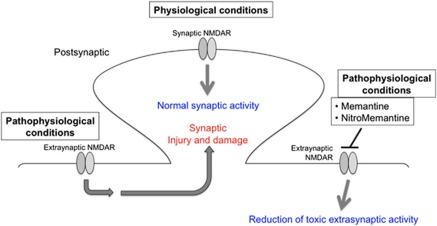Figure 5.
‘UFO'-type neuroprotective drugs, like memantine and NitroMemantine, preferentially block extrasynaptic NMDARs. Physiological synaptic activity of the NMDAR is required for neurotransmission and neuronal cell survival. In contrast, excessive activation of extrasynaptic NMDARs induces synaptic injury and neuronal loss, and is often associated with the accumulation of misfolded proteins as well as mitochondrial dysfunction. Conventional NMDAR antagonists, such as MK-801, completely block all receptor activity, including physiological synaptic activity, and thus result in severe side effects and clinical intolerability. Memantine and the newer NitroMemantine drugs preferentially block excessive (pathological) extrasynaptic NMDA receptor activity, while relatively sparing normal (physiological) synaptic activity89, 90

